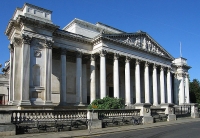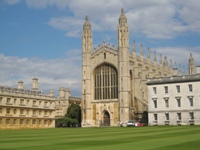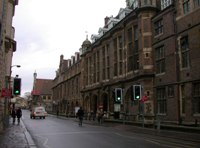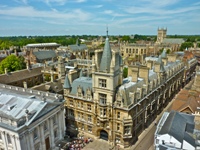City guides


Cambridge Travel Guide
With a university heritage dating back as far as 1209, the city of Cambridge is steeped in tradition. Its colleges have been added piecemeal by patrons over centuries, with visitors enjoying 800 years of European architecture. The prestigious University of Cambridge, which dates back to the 13th century, gives the town an academic gravitas while simultaneously providing it with a youthful and exuberant population.
Cambridge offers a number of historic buildings and sites worth exploring, including Kings College Chapel, the Church of the Holy Sepulchre, and the Great St Mary's Church. There are also a plethora of top-notch museums in Cambridge, dedicated to zoology, classical archaeology, earth sciences, anthropology, art, and local history.
Daffodils and summer flowers carpet the Backs, the name given to an area covering the banks of the River Cam. This make summer and spring ideal seasons punting in Cambridge. The city has a number of parks and gardens that provide quiet retreats from the urban city centre.
Cambridge offers first class accommodation, as well as an abundance of shops, culture, and entertainment, all features that make the pretty town one of England's most popular holiday destinations. It hosts several popular festivals, including the Cambridge Summer Music Festival and the Cambridge Shakespeare Festival.
Things to do in Cambridge
Strolling around Cambridge is a joy and a walking tour is the best way to get an introduction to the city. Visit Cambridge organises official guided tours with highly qualified guides, which include the university and colleges. These tours depart every day of the week from the Tourist Information Centre. There are even ghost tours available.
Another must is a boat trip down the famous canals, which will give visitors a chance to see the Backs. River tours can also be arranged from the Tourist Information Centre. Bicycles are readily available and there are dedicated lanes for cyclists. The hop-on hop-off tourist buses complete the array of fun sightseeing options.
Apart from the myriad attractions of the campus, top tourist sites in Cambridge include the art gallery of Kettle's Yard, the Fitzwilliam Museum, the Imperial War Museum (Duxford), the Cambridge American Cemetery and Memorial, and Anglesey Abbey.
Church lovers will enjoy the Church of St Mary the Great and the Church of the Holy Sepulchre, which is one of only four round medieval churches in western Europe. If the weather is good, a picnic in the Cambridge University Botanic Garden is a lovely way to while away the hours, particularly in spring when the gardens are a riot of colour.

The Fitzwilliam Museum
The Fitzwilliam Museum in Cambridge has been described as one of the greatest art collections in the UK, and was named Best Small Museum in Europe by the Director of the National Gallery of Art in Washington, DC. Setting aside a few hours to explore the museum should be first on every art lover's list of things to do in Cambridge. The Fitzwilliam Museum houses an extensive art collection from a number of countries across Europe and the Near East. Visitors can marvel at the inspiring sculptures, drawings, prints, armour, pottery, paintings, and antiquities on display, which date from the 14th century to the present day.

Kettle's Yard
Kettle's Yard is an art lover's dream and one of the finest art galleries in Britain. Originally the private home of Jim Ede (former curator of the Tate), Kettle's Yard houses the impressive art collection that Ede donated to the University of Cambridge in 1966, and the house itself is charming. The gallery's permanent collection consists of mainly 20th and 21st century artists, including Henry Moore and Joan Miro. The informal art gallery space is a popular attraction in Cambridge for tourists and locals alike. Visitors should budget at least a couple of hours to do the collection justice and to spend some time soaking up the scenery.

King's College Chapel
Perhaps the most popular attraction in the town of Cambridge is the university itself. Steeped in tradition, Cambridge University is the second-oldest university in England, losing out only to Oxford University. The university's colleges are the main attraction on this beautiful campus. Viewing the colleges gives visitors the opportunity to stroll through Britain's architectural history. Peterhouse is the oldest college, founded in 1284; while Homerton College was approved in 2010, making it the newest addition to the Cambridge family. King's College and the Gothic-style King's College Chapel are not to be missed on this prestigious campus. The intricate chapel was built over a period of nearly a hundred years (1446 to 1531) and is home to the famous Chapel Choir, made up of college students as well as younger choristers from King's College School.

The Sedgwick Museum of Earth Sciences
A popular Cambridge attraction for visitors wishing to learn more about the geology of the area surrounding Cambridge is the University's Sedgwick Museum of Earth Sciences. The museum was opened in 1904 and houses an extensive collection of fossils, rocks, minerals, and crystals. Visitors can view the fossil collection of Dr John Woodward, a well-known 17th and 18th century British geologist, as well as rocks collected by Charles Darwin and other interesting artefacts that chart more than 550 million years of the planet's history. The Sedgwick Museum is fascinating even for those who are uninitiated in the Earth Sciences.

Church of St Mary the Great
The Great St Mary's Church, as it is locally known, is central to Cambridge and its university life. It is the official university church, and according to university rules, all Cambridge undergraduates must live within a three-mile (5km) radius of the church, while university officers are required to live within 20 miles (32km). St Mary's was completed in 1205, before being destroyed by fire and rebuilt again in 1290. Cambridge University sermons are conducted here, and day visitors are invited to climb the tower and appreciate the lovely views it affords of the town's historic market square. The church hosts many events and visitors are welcome at services.
Getting Around
Transport in Cambridge is simple and easy, provided visitors don't drive a car. The best way to get around Cambridge is by bicycle. Bicycles can be hired at any number of the cycle hire shops in central Cambridge. The town is cycle friendly with over 80 miles (130km) of dedicated cycle routes, lanes and roads. Maps of the cycle routes can be acquired at the Cambridge Visitor's Information Centre or on the Cambridge City Council's Website. Park and ride options are available along most major routes into Cambridge. There are also a number of local buses ready to transport visitors around the city.
Bus routes go in and around town as well as from central Cambridge to the outlying towns and villages. The city sightseeing hop-on-hop-off bus is a great way for visitors to take in all the attractions on their way around town. Free transportation is available during business hours from Monday to Saturday on the city centre shuttle bus. The free shuttle can be used from Market Square, Corpus Christi College, Fair Street, Jesus Lane and Trinity Street. Buses tend to leave each station at 15 minute intervals.
Further transport options for visitors to Cambridge include taxis and cars, though these are not recommended. There are a number of taxi companies in Cambridge and rates per kilometre are dictated by the city council. Taxi ranks are located on St Andrew's Street and on Drummer Street during the day while night-time taxis can usually be found on Sidney Street and at Market Square. Travelling around Cambridge by taxi or car is made cumbersome, and expensive, by the multitude of one-way streets, no car roads and cycle-only areas in the city.
In an effort to provide a relaxing, car-free atmosphere around the city, the Cambridge City Council has declared a number of pedestrian zones. Visitors to Cambridge can explore the city without having to worry about traffic, parking or the noise and air pollution created by cars. The pedestrian zones effectively limit car and cycle access to the centre of Cambridge during business hours.
Cambridge Climate and Weather
The climate in Cambridge is on par with the rest of the United Kingdom, but because it is situated in the more sheltered region of Eastern England, Cambridge enjoys significantly less rainfall than the rest of the country. Winters tend to be quite cold and they're often wet but the area experiences less snowfall than the rest of England.
Summers are dry and temperatures range between 65F (18C) and 73F (23C). The best time to visit Cambridge is any time between April and September when it is warm and often sunny; however, even though the city is drier than much of the rest of England, rain is still possible in any season.
United Kingdom travel info
Electricity
The electrical current in the UK is 240 volts, 50Hz. Flat, three-pin plugs are standard.
Language
English is the official language, though visitors will be astonished by the variety of regional accents.
Money
The currency is the British pound (GBP), which is divided into 100 pence. ATMs are available in almost all towns and Visa, MasterCard and American Express are widely accepted. Foreign currency can be exchanged at bureaux de change and large hotels, though better exchange rates are likely to be found at banks.
Tipping
Tips of 10 to 15 percent are expected in restaurants and upmarket hotels in the UK if a service charge hasn't been included. Hotel service staff receive an optional amount, while taxi drivers are usually given 10 to 15 percent of the fare. Tipping bartenders isn't expected, and tipping for other services is discretionary.
Health
There are no specific health risks associated with travel to the UK and food and water can be considered safe. The British National Health Service is excellent, and a number of countries have reciprocal health agreements with the UK including Australia, New Zealand and EU countries. Visitors from other countries such as Canada, South Africa and the United States are advised to take out comprehensive travel insurance.
Safety
It's generally safe to travel throughout the UK.
Local customs
Handshaking is customary when introduced to someone new. Smoking is banned in all enclosed public spaces, including pubs, restaurants and public transport. Queue barging is frowned upon and there is strict etiquette on escalators: stand on the right, walk on the left. Visitors may find Londoners more rushed and less friendly than locals in other parts of the country, particularly on London transport, where tourists are often the only people who talk.
Doing business
The four countries of the United Kingdom, although culturally and historically different, generally keep to the same business practices. Politeness and punctuality are key to good business relations and initial meetings are often conducted formally and impersonally, becoming more open and social as things progress. Business cards are exchanged at introductions, and dress is formal with dark suits preferred. Business hours are generally 8am to 5pm Monday to Friday with an hour taken at lunch.
The communication style can be difficult to adjust to: the British people respect politeness to a point that often obscures their ability to say exactly what they mean. As a result, travelling business people may need to learn to 'read between the lines' and to take cues from tone of voice and facial expression. Humour is also an integral part of the British system of communication, and is used to diffuse a tense situation and to cultivate relationships. Foreigners should never assume that an attempt at humour undermines a person's ability to do their job, or discredits the importance they attach to a deal or negotiation. Furthermore, they shouldn't be fooled into thinking that the British propensity for irony and sarcasm equates with an informal work environment.
Foreigners should be tactful during meetings, avoid becoming emotional and illustrate their experience with the subject at hand. Performance and initiative are looked upon favourably, whereas academic pretension is given far less credence. Meetings are often used as platforms for debate, rather than moments of confirmation, so there should be no surprise if not much progress is made. Foreigners should be sure to respect and appeal to all parties involved, as the British have recently begun to take a far flatter approach to management and the responsibility of decision-making. And if things go well, it's worth purchasing a pint or two for clients or colleagues; though gifts are borderline inappropriate, a round of drinks will rarely be refused.
Duty free
Travellers can bring the following goods into the UK tax or duty free: 200 cigarettes, 100 cigarillos, 50 cigars or 250g of tobacco, 18 litres of still table wine, 42 litres of beer, 4 litres of spirits or strong liqueurs or 9 litres of fortified wine, sparkling wine or other alcoholic beverages of less than 22 per cent volume.
Communications
The international country dialling code for the UK is +44. Mobile phone coverage is extensive and free WiFi is widely available in pubs and coffee shops. Travellers can purchase local prepaid SIM cards for unlocked phones or use eSIMs if their cellular providers support it on their networks.
Passport & Visa
If a visa is not required, travellers should hold a return or onward ticket, and proof of funds for the duration of stay. Passports must be valid for the period of intended stay in the UK. It's highly recommended that travellers' passports have at least six months' validity remaining after the intended date of departure from their travel destination. Immigration officials often apply different rules to those stated by travel agents and official sources. For visitors who are visa exempt up to a maximum stay of six months, the period of stay will be determined by the Immigration Officer on arrival.
Entry requirements
US travellers must hold a passport that is valid for the duration of their stay; a visa is not required for stays of up to six months.
Canadian passports must be valid for at least the expected duration of the stay. No visa is required for stays of six months or less.
Australian passports must be valid for at least six months after the departure date. No visa is required for stays of six months or less.
South Africans require a valid passport and a visa for entry or transit through the UK. South African temporary passports are not recognised.
Under the Common Travel Area agreement, citizens from the UK and Ireland are not required to pass through passport control. They can travel between both countries without a valid passport if they can prove they are a valid UK or Irish national.
New Zealand nationals must hold a valid passport, but no visa is required for stays of up to six months.
Useful contacts
United Kingdom Tourism Website: www.visitbritain.com
999 (General)Embassies / consulates in other countries
British Embassy, Washington DC, United States: +1 202 588 6500.
British High Commission, Ottawa, Canada: +1 613 237 1530.
British High Commission, Canberra, Australia: +61 2 6270 6666.
British High Commission, Pretoria, South Africa: +27 12 421 7500.
British Embassy, Dublin, Ireland: +353 1 205 3700.
British High Commission, Wellington, New Zealand: +64 4 924 2888.
Embassies / consulates in United Kingdom
United States Embassy, London: +44 20 7499 9000.
Canadian High Commission, London: +44 20 7004 6000.
Australian High Commission, London: +44 20 7379 4334.
South African High Commission, London: +44 20 7451 7299.
Irish Embassy, London: +44 20 7235 2171.
New Zealand High Commission, London: +44 20 7930 8422.


